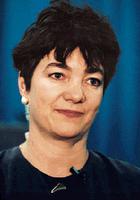
Copps, Sheila Maureen
Sheila Maureen Copps, politician (b at Hamilton 27 Nov 1952). As the daughter of longtime Hamilton Mayor Victor Copps, she was introduced to politics at an early age. After a BA at the University of Western Ontario and a short time as a journalist with the Ottawa Citizen and Hamilton Spectator, Copps actively entered the political arena at the provincial level. She lost in her bid for a seat in the 1977 Ontario general election and then took a job working for Ontario Liberal Leader Stuart Smith.She successfully ran for the legislature in 1981 and the next year was a candidate for the leadership of the provincial Liberal Party, placing second to David Petersen. She switched to federal politics in 1984 and won one of only 40 Liberal seats in the Mulroney landslide. The small Liberal Opposition was impotent against the huge Mulroney majority, and so Copps and a few other young Liberal MPs, including John Nunziata and Brian TOBIN, went on the offensive. Their brash, abrasive manner in the House of Commons earned them the name of the Rat Pack. Their raucous tactics proved to be the Liberals' best weapon against the Tory government. Copps was particularly successful at irritating Prime Minister Mulroney and senior minister John Crosbie.
An excellent campaigner with fluency in French and Italian, she held her seat in the 1988 election. A new, calmer Copps made an unsuccessful bid for the federal Liberal leadership in 1990 but proved herself to be a major power within the party. Following the 1993 Liberal victory, Copps was named deputy prime minister and minister responsible for the environment. In January 1996 she moved from the environment to Canadian Heritage. Copps had promised during the election to resign if the Liberals failed to eliminate the controversial GST. In the 1996 budget Finance Minister Paul Martin admitted that the tax, in one form or another, would remain. Copps's promise made her the target of the Opposition's anger, and under extreme pressure she resigned her seat in May of 1996 and announced she would seek redemption in a by-election. She was re-elected June 17, taking half the vote in the Hamilton East by-election and two days later Chrétien brought her back as deputy prime minister and minister of Canadian heritage.
After the election of 1997, Copps was re-appointed to the Heritage portfolio. Regarded as a cultural nationalist, she established the Canadian Television and Cable Production Fund for independent film and television production and introduced copyright protection for recording artists and producers. She has written an interim political autobiography, Nobody's Baby (1986). In a controversial May 1999 agreement with the United States, she agreed to amend Bill C-55, the Foreign Publishers Advertising Services Act, allowing foreign publishers to publish up to 18% of advertisements aimed at the Canadian market in split-run magazines (editions of foreign magazines published in Canada with mostly foreign content but with Canadian advertisements), with increased tax deductions for advertisers who publish in magazines with at least 80% original or Canadian content.

 Share on Facebook
Share on Facebook Share on X
Share on X Share by Email
Share by Email Share on Google Classroom
Share on Google Classroom


